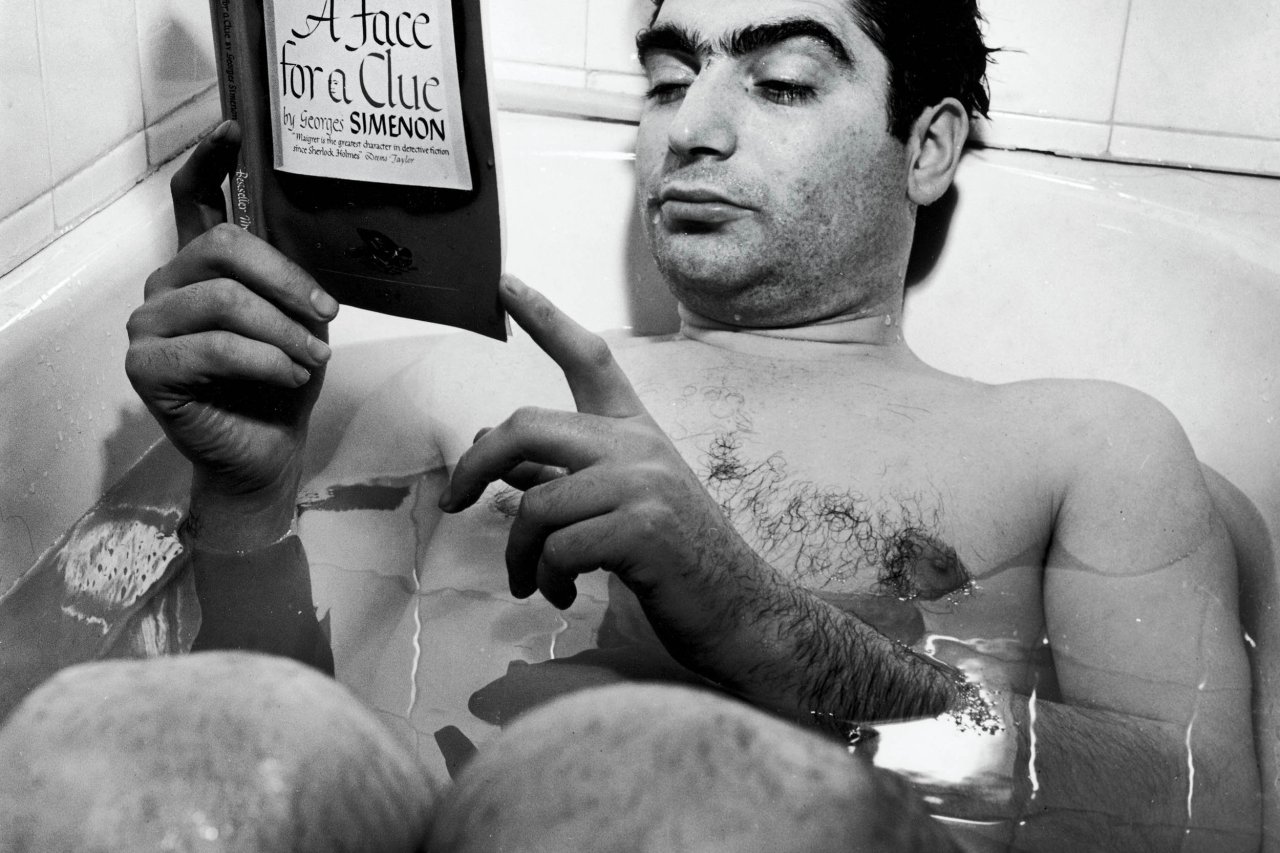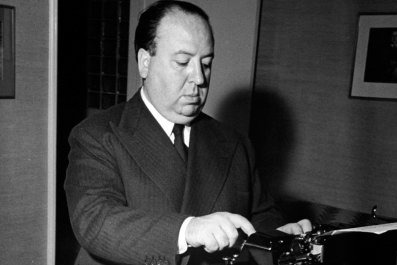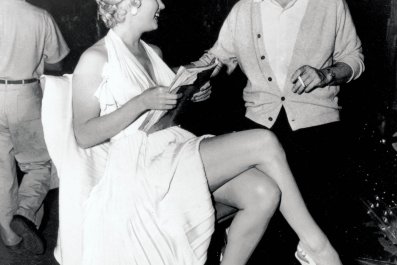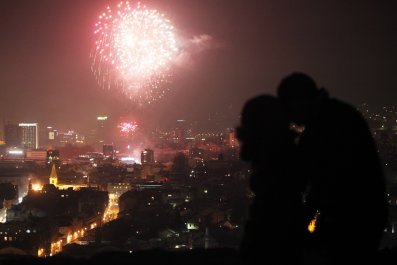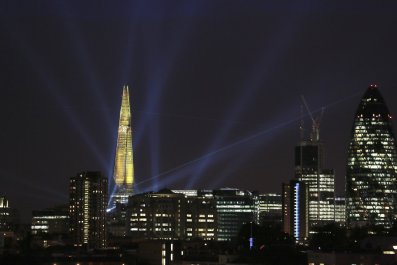The house where the novel lives today had its foundation laid about 1,000 years ago by Lady Murasaki, with a little help from Homer and the ancient Babylonian scribes who punched The Epic of Gilgamesh into clay tablets. Henry Fielding helped with the walls, Cervantes added the windows, warped glass and all. The great 19th century Russians raised the sturdy roof beams. Dickens and Austen added a fireplace and drawing room. Proust, Joyce and Woolf built a somewhat severe modernist wing. Pynchon plopped down some prurient lawn gnomes.
But no house stands forever, and, lately, the novel has started to tilt toward oblivion. That's largely because it has been supplanted as the primary means of telling stories. For pure narrative whiz-bang, it's hard for the page to compete with the screen. All the way back in the cultural prehistory that was 1996, Jonathan Franzen worried in a landmark Harper's essay that "we are truly up against what truly seems like the obsolescence of serious art in general." And that was before The Sopranos, before Grand Theft Auto, before Twitter and Facebook and even Friendster. Franzen wrote on paper, for people who read on paper, for whom reading was still the primary gateway to unreal realities. Little did they know. Little do any of us, ever.
The death of the novel has been much discussed, like the plight of a once grand mansion that has since become an eyesore. To talk about the end of fiction, to churn out think pieces about its certain demise, is to evince a cool knowledge of impending disaster, to meet cultural disaster with sangfroid. Did another bookstore just close? Did you read the latest report on Americans' reading habits? To the laptops!
But maybe not yet. Perhaps a restoration is possible, if not exactly to the form of those resplendent Don Quixote days, when one could look out over the hills and see no other mansions (now, the gaudy Netflix palace crowds out the views). Reading is a basic human activity: It predates Jeff Bezos, as I understand it, and will persist as long as nerves from the retina lead to the brain. Telling stories is just as central to the human enterprise: stories not just of what happened yesterday but what could have happened, and what happened 1,000 yesterdays ago, and what might happen 10,000 days from now. The novel has served this purpose well, but, facing extinction, it might need a transformation to survive; what digital natives call a hack.
Precisely such a hack was loudly and convincingly suggested four years ago by David Shields in Reality Hunger: A Manifesto. An aphoristic, weird work of literary criticism, Reality Hunger argues that to survive, the novel must become less like itself, to just stop with the whole plot-character-theme business. Homeland can do that better anyway, so why even bother trying to keep up, especially without Claire Danes on your side? If you have something to say, say it plainly, without all the juvenile disguises of the novel.
The novel, Shields says, is just a form and "[forms] serve the culture; when they die, they die for a good reason: They're no longer embodying what it's like to be alive." Shields suggests that creative nonfiction—the essay as an art form, which he calls the lyrical essay—is a solution that retains the novel's artistry while discarding its artifice. "We like nonfiction because we live in fictitious times." Along with the lyrical essay, the memoir rides high in Reality Hunger: storytelling as self-examination, à la Montaigne or Joan Didion, true life instead of fake life.
Wait a minute, you're surely thinking, a novel that isn't telling a fictional story isn't a novel. No, I suppose it isn't. Shields is advocating for some hybrid, a bricolage of true stuff and made-up stuff and thought and observation and rumination and conjecture. He cites portions of both Moby-Dick and Hamlet as showcasing this very quality, forgoing the devices of the novel and simply preaching truth to the reader. But you know the notion of plot that your ninth-grade English teacher taught you, the one that Aristotle first suggested in the Poetics? That, says Shields, is about as outdated as your first Kindle, the one with the panoply of buttons beneath the screen.
Lately, Shields's ideas about the novel seem to have been borne out by the reading public. Probably the biggest literary surprise of the past three years has been Karl Ove Knausgaard's My Struggle, a massive six-volume autobiography disguised (but only barely) as a novel. To read Knausgaard for plot is to watch Bergman for the fart jokes, and yet his Shieldsian novels have enjoyed immense popularity, probably because they satisfy a need deeper than what-happens-next-to-the-two-lovers-stranded-in-a-hurricane or I-hope-he-finds-the-bomb-before-it-levels-Baltimore. Reviewing the third volume of My Struggle in The New York Times earlier this year, the American novelist Rivka Galchen wrote, "What at first appears to be the problem of how we as readers have patience for so much information reveals itself, upon inspection, as the problem of how it is that, with so little information, we feel we have witnessed an entire life."
The essay, too, had a good year, with Leslie Jamison's The Empathy Exams and Eula Biss's On Immunity: An Inoculation two of the most widely praised collections. These are not the sorts of "essays" you had to read in American History 403: The Socio-Poetics of the Louisiana Purchase, nor of the sort you'd encounter in Theoretical Cellular Physics Monthly. These essays are personal, inquisitive, alive, written by young women clearly intent on more than just providing entertainment. For cheap thrills, you can just watch Mad Men.
Reviewing the essays of Charles D'Ambrosio in The L Magazine, a critic perceptively notes that "there's a reason that essays are having a moment.… [Our] cultural discourse veers from one stridently argued conclusion to the next, an impoverished stream of takes and summations that leaves no room for ambivalence or nuance. The essay is the one forum in which we can find the contradictions, bewilderment, and uncertainty that are the dark matter of daily life."
The novel still stands, sure enough, but it stands uneasily, a kitschy McMansion whose vocabulary is steadfastly outdated, a form that can only look backward. I can't think of a single full-length novel published in 2014 that did anything new. Most of the ones I read rehashed the same realistic formula that has held at least since Raskolnikov wandered through St. Petersburg's dingy courtyards.
So is Shields right? Is Knausgaard our savior? Are essays the new novels? Are novels going the way of illuminated manuscripts? Impossible questions, all. But this is a good time to remember Ezra Pound's ferocious, uncompromising dictum: Make it new.



